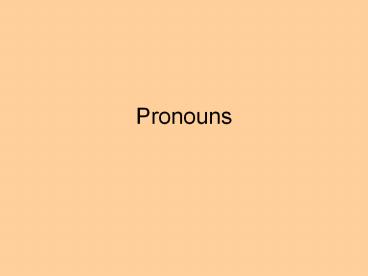Pronouns PowerPoint PPT Presentation
1 / 13
Title: Pronouns
1
Pronouns
2
Cases of Personal Pronouns
Case/exam. Use Example Condition
Nominative (subject case) I, we, you, he, she, it, they Subject Predicate pronoun We ate the pear. Your friend is I. Usually before the verb be verb linking the subject to predicate
Objective me, us, you, him, her, it, them Direct object Arrows point to DO Indirect object Arrows point to DO Object of a preposition Jim saw me. Al gave me a bat. Al gave the bat to me. Takes the action of verb to whom or for whom the action is done ends a prepositional phrase
Possessive my, mine, our, ours, your, yours, his, her, hers, its, their, theirs Show ownership Is this pen yours? Is this your pen? Is this pen his? Is this his pen? Use the form ending in s when the object that is owned does not follow the pronoun (his its are exceptions) Possessive pronouns never use apostrophes.
3
Who or Whom
- Who is nominative.
- Who is used as the subject of a question or the
subject of a subordinate clause (dependent
clause). - Whom is objective.
- Whom is used as a direct object, and indirect
object, or the object of a preposition.
4
Who
Subject of question Subject of a subordinate clause
Who understands pronouns? I admire a student who studies pronouns.
5
WhomHint it often helps to rewrite the sentence
or the clause
Direct object Indirect object Object of preposition
Whom did he see in the game? He did see whom in the game. Whom did he give the ball? He did give whom the ball. From whom did he get the ball? He did get the ball from whom.
I know the person whom he met at the game. He met whom at the game. Janet thanked her aunt, from whom she had received a ball. She had received a ball from whom.
6
Indefinite pronouns refer to people, places, or
things often without specifying which ones
Includes ones body thing
Singular Plural Singular or Plural
another little someone anybody much something anyone neither anything nobody each no one either nothing everybody one everyone other everything somebody both few many others several all any more most none some
7
Subject/verb agreement w/ indefinite pronouns as
subjects
- Pronouns that are always singular will always
take a singular or s verb. - One of the submarines is equipped with radar.
- Everybody on the submarine was frightened by
thoughts of the attack. - Neither of the strategies seems workable.
- Ignore the prepositional phrases
8
Subject/verb agreement w/ indefinite pronouns as
subjects
- Pronouns that are always plural will always take
a plural or base verb. - Many of the soldiers fight on the wars front
lines. - Others work to supply them with food and
ammunition. - Several contribute as code breakers.
Ignore the prepositional phrases
9
Subject/verb agreement w/ indefinite pronouns as
subjects
- When using pronouns that can be either singular
or plural you must examine the context of the
sentence - Most of the war has been fought.
- Most of the battles have been fought.
- Pay attention to the prepositional phrases
10
Making personal pronouns and indefinite pronouns
agree
- Ignore the object of any prepositional phrases
that might fall between the personal and
indefinite pronoun. - Incorrect
- Neither of the EMTs has completed their training.
- Put each instrument in their place.
- Correct
- Neither of the EMTs has completed his or her
training. - Put each instrument in its place.
11
Making personal pronouns and indefinite pronouns
agree for gender
- If the gender is unknown, a writer may use he or
she, or him or her. - Each of the crew members checked his or her
equipment. - If the gender is unknown, a writer may rewrite
the sentence to eliminate the gender issue. - All of the crew members checked their equipment.
12
Agreement between pronouns and antecedents
- Pronouns must agree in both person and number.
- Number indicates singular or plural.
- Person indicates whether a pronoun refers to
- the person speaking (first person)
- The person spoken to (second person)
- The person, place, or thing spoken about (third)
13
Agreement between pronouns and antecedents
- Avoid shifts in Person.
- Incorrect
- Jim is practicing writing, a skill you need to
master if you want to do well in school. - Correct
- Jim is practicing writing, a skill he needs to
master if he wants to do well in school. - Singular antecedents joined by or or nor must
have a singular pronoun. - Either Mary or Sue should bring her camera.
- Pat and Mike brought their cameras.

